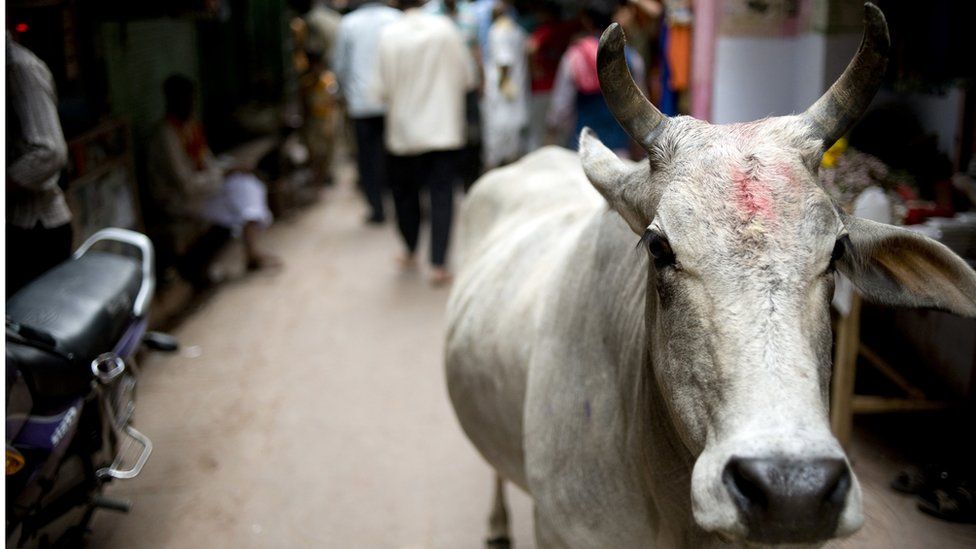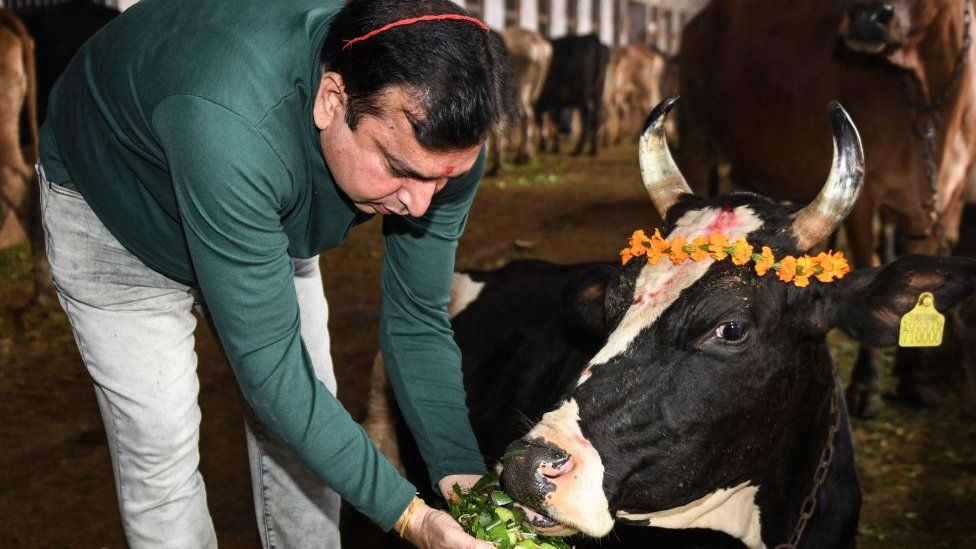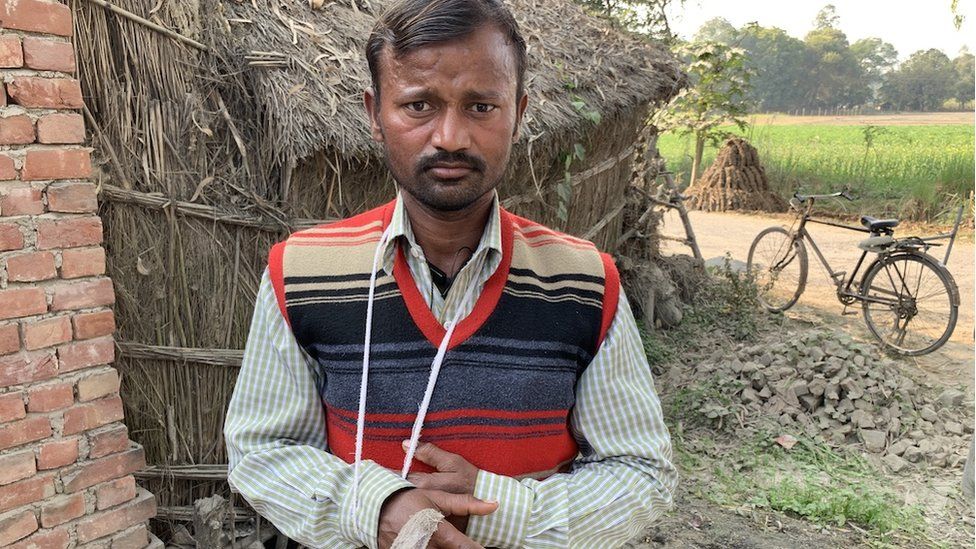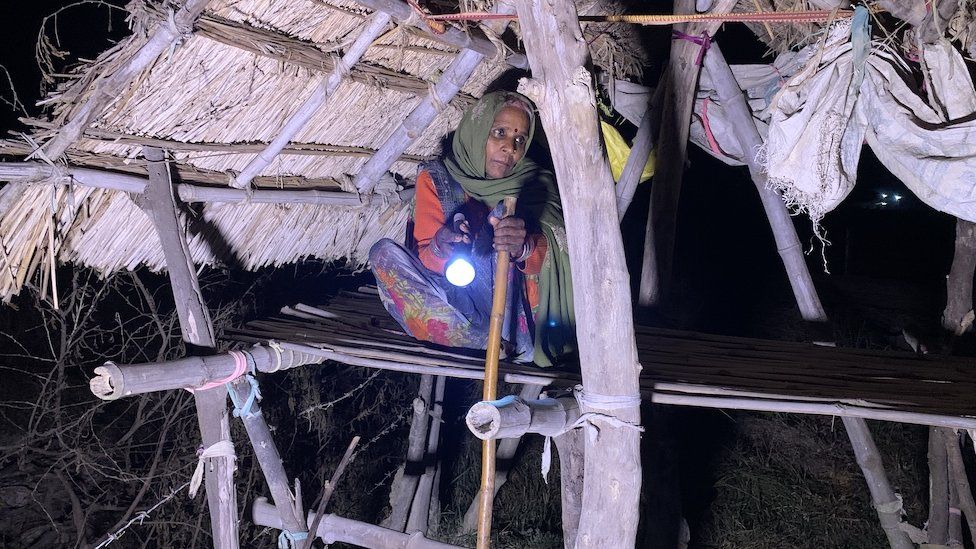Uttar Pradesh: Why deadly cow attacks are an issue in Indian state election

IMAGE SOURCE,GETTY IMAGESImage caption,
Stray cattle are a common sight in India's towns and villages
Ram Raj was drinking tea at his home in the northern Indian state of Uttar Pradesh on a chilly November evening last year when a stray cow attacked him.
Over the next few minutes, his young grandchildren screamed and watched in horror as the animal mauled him. The 55-year-old farmer died of severe injuries on the way to hospital.
"It was a painful death and my mother-in-law has stopped having proper meals ever since," his daughter-in-law, Anita Kumari, said.
Such attacks have become common in India's most populous state, where a ban on cow slaughter has led to a huge rise in the cattle population. So much so that they have become an issue in the state's upcoming elections, which are set to begin on 10 February.
Hindus consider the cow holy, but until recently many farmers took their old cows to slaughterhouses.
"We used to sell our cows once they stopped giving milk or were no longer fit for ploughing fields. That was our back-up plan for hard times," says Shiv Pujan, a paddy farmer.
But Prime Minister Narendra Modi's Bharatiya Janata Party (BJP)-led government has cracked down heavily on cow slaughter in keeping with its right-wing Hindu agenda - the practice is now illegal in 18 states, including Uttar Pradesh, or UP.

Stray cattle are a common sight in India's towns and villages
Ram Raj was drinking tea at his home in the northern Indian state of Uttar Pradesh on a chilly November evening last year when a stray cow attacked him.
Over the next few minutes, his young grandchildren screamed and watched in horror as the animal mauled him. The 55-year-old farmer died of severe injuries on the way to hospital.
"It was a painful death and my mother-in-law has stopped having proper meals ever since," his daughter-in-law, Anita Kumari, said.
Such attacks have become common in India's most populous state, where a ban on cow slaughter has led to a huge rise in the cattle population. So much so that they have become an issue in the state's upcoming elections, which are set to begin on 10 February.
Hindus consider the cow holy, but until recently many farmers took their old cows to slaughterhouses.
"We used to sell our cows once they stopped giving milk or were no longer fit for ploughing fields. That was our back-up plan for hard times," says Shiv Pujan, a paddy farmer.
But Prime Minister Narendra Modi's Bharatiya Janata Party (BJP)-led government has cracked down heavily on cow slaughter in keeping with its right-wing Hindu agenda - the practice is now illegal in 18 states, including Uttar Pradesh, or UP.

IMAGE SOURCE,GETTY IMAGESImage caption,
Hindus consider the cow to be a sacred animal
Here, Chief Minister Yogi Adityanath, a hardline BJP leader himself, shut down several allegedly illegal slaughterhouses after coming to power in 2017 - even though this is a huge business in UP, which is a major exporter of buffalo meat.
Cattle traders, many of them Muslims or Dalits (formerly untouchables, who are at the bottom of the Hindu caste hierarchy), have even been attacked and killed by vigilantes often linked to the BJP or local right-wing groups.
So, many of them have given up on the business, fearful of buying or transporting cattle. And farmers now simply abandon old and unproductive cows.
"Now there aren't any buyers so obviously, no-one can sell them," Mr Pujan says, adding that he and others are forced to leave old cattle in nearby forests.
These stray cattle are often seen roaming the towns and villages in UP, where farmers and locals say they turn hungry and aggressive. One such cow entered the courtyard of Ram Raj's home and when he and his family got scared and started yelling, it attacked him.
Mr Pujan himself was recently attacked by a herd of stray cattle while trying to chase them away from his field.
"Two of them tried to push me down to the ground and I ran for my life," he said, showing his bandaged hand, which was cut while he scaled a barbed wire fence.
Mr Pujan is a devoted Hindu who believes the cow is holy, but he also says he is frustrated with the government's blanket order that all of them should be protected.
Farmers like him say the stray cows also destroy crops, cause road accidents and kill people.

Hindus consider the cow to be a sacred animal
Here, Chief Minister Yogi Adityanath, a hardline BJP leader himself, shut down several allegedly illegal slaughterhouses after coming to power in 2017 - even though this is a huge business in UP, which is a major exporter of buffalo meat.
Cattle traders, many of them Muslims or Dalits (formerly untouchables, who are at the bottom of the Hindu caste hierarchy), have even been attacked and killed by vigilantes often linked to the BJP or local right-wing groups.
So, many of them have given up on the business, fearful of buying or transporting cattle. And farmers now simply abandon old and unproductive cows.
"Now there aren't any buyers so obviously, no-one can sell them," Mr Pujan says, adding that he and others are forced to leave old cattle in nearby forests.
These stray cattle are often seen roaming the towns and villages in UP, where farmers and locals say they turn hungry and aggressive. One such cow entered the courtyard of Ram Raj's home and when he and his family got scared and started yelling, it attacked him.
Mr Pujan himself was recently attacked by a herd of stray cattle while trying to chase them away from his field.
"Two of them tried to push me down to the ground and I ran for my life," he said, showing his bandaged hand, which was cut while he scaled a barbed wire fence.
Mr Pujan is a devoted Hindu who believes the cow is holy, but he also says he is frustrated with the government's blanket order that all of them should be protected.
Farmers like him say the stray cows also destroy crops, cause road accidents and kill people.

IMAGE SOURCE,NITIN SRIVASTAVA/BBCImage caption,
Shiv Pujan says the cow is holy but stray cattle are a menace to everyone
"My son is an orphan now because of the stray cows roaming around. Who will look after us?" asks Poonam Dubey whose husband was killed by a stray bull.
Bhupendra Dubey, 36, had returned to his village after losing his job during the first wave of Covid-19 in 2020. He died when the animal attacked him in the local market, where he had gone to buy sweets for his son.
About 100km (62 miles) away, Ram Kali, 80, has been in a coma since 2019, when she was attacked by a cow. Her family says she still doesn't know that her only son died of Covid-19 early last year.
Opposition parties have taken up the issue in UP, a largely rural state where farmers are a crucial voting bloc.
The governing BJP's state spokesperson, Sameer Singh, said that the government was "devising new strategies" to deal with the problem.
"These should not be called stray cows as the animal itself is part of the Hindu culture. We never leave our elders to die when they grow old, how can we leave our cows to die on the roads?"
The cows are meant to be housed in cow shelters - Mr Adityanath's government has allocated millions of rupees to construct more shelters. They also imposed a special alcohol tax to maintain thousands of state-run cow shelters.

Shiv Pujan says the cow is holy but stray cattle are a menace to everyone
"My son is an orphan now because of the stray cows roaming around. Who will look after us?" asks Poonam Dubey whose husband was killed by a stray bull.
Bhupendra Dubey, 36, had returned to his village after losing his job during the first wave of Covid-19 in 2020. He died when the animal attacked him in the local market, where he had gone to buy sweets for his son.
About 100km (62 miles) away, Ram Kali, 80, has been in a coma since 2019, when she was attacked by a cow. Her family says she still doesn't know that her only son died of Covid-19 early last year.
Opposition parties have taken up the issue in UP, a largely rural state where farmers are a crucial voting bloc.
The governing BJP's state spokesperson, Sameer Singh, said that the government was "devising new strategies" to deal with the problem.
"These should not be called stray cows as the animal itself is part of the Hindu culture. We never leave our elders to die when they grow old, how can we leave our cows to die on the roads?"
The cows are meant to be housed in cow shelters - Mr Adityanath's government has allocated millions of rupees to construct more shelters. They also imposed a special alcohol tax to maintain thousands of state-run cow shelters.

IMAGE SOURCE,NITIN SRIVASTAVA/BBCImage caption,
Bimla Kumari is among farmers who do night patrols to keep cattle out of the fields
But this hasn't solved the problem. A government-run shelter that BBC Hindi visited in Ayodhya district was packed with cows jostling for space.
"There are 200 cows here, which is our maximum capacity. Some 700-1,000 stray cows are still roaming around the area," said Shatrughan Tiwari, who looks after the shelter.
Many farmers, meanwhile, are guarding their farms round the clock.
They form groups that take turns to patrol the fields through the night, braving the cold and snakes.
"We have groups of people from across the village who keep taking turns. A new team will arrive in the morning to replace us, and then we will go home and rest," said Bimla Kumari, a 64-year-old farmer.
Others, like Dina Nath, said they are fed up with the issue, and are considering boycotting the election.
"What is the point in voting if our problems aren't solved by it?"
Bimla Kumari is among farmers who do night patrols to keep cattle out of the fields
But this hasn't solved the problem. A government-run shelter that BBC Hindi visited in Ayodhya district was packed with cows jostling for space.
"There are 200 cows here, which is our maximum capacity. Some 700-1,000 stray cows are still roaming around the area," said Shatrughan Tiwari, who looks after the shelter.
Many farmers, meanwhile, are guarding their farms round the clock.
They form groups that take turns to patrol the fields through the night, braving the cold and snakes.
"We have groups of people from across the village who keep taking turns. A new team will arrive in the morning to replace us, and then we will go home and rest," said Bimla Kumari, a 64-year-old farmer.
Others, like Dina Nath, said they are fed up with the issue, and are considering boycotting the election.
"What is the point in voting if our problems aren't solved by it?"
*********
kt comments:
I experienced cows (and bulls too) roaming around freely in my kampong in Ayer Itam, like free range chooks - most of us in the kampong know the cattle's owner(s) - one an Indian and the other a Punjabi, among several others.
The reason those cattle roamed around freely was because their owner (in particular the Indian who lived 300 metres from my house) allowed them to as he didn't have a pasture to confine them in.
If I left my garden gate opened when those cows were roaming around, t'was the end of my sister's flowering plants, wakakaka, and I would receive 'hell' from her. At times I found a few cows grazing in my garden quite aggressive and wouldn't countenance my shoo-ing efforts - instead they would chase me around.
My late mum wasn't helpful as she, a true devotee of the Pure Land Buddhism (Jìngtǔzōng 淨土宗), held the cow in a very special position in her spiritual considerations - her religion taught her to recognize the cow (or more correctly, the buffalo) as a helpful-useful creature which plows the fields for crops to feed the people.
Amitabha Buddha with bodhisattvas Avalokiteshvara (Kuan Yin) (right) and Mahasthamaprapta (Shih Chih)
Therefore killing buffaloes (and cattle in general) was and still is deemed as unnecessarily cruel. Pure Land Buddhists usually refrain from partaking of beef dishes. As a kid I was not permitted to eat beef, and no beef was ever tolerated in my house. Even my late father who like me loved beef would have to eat the meat outside, mostly at nasi kandar stalls.
And yes, Kuan Yin (not related to Kuan Yew, wakakaka) is one of the Divine Trio worshipped in Pure Land Buddhism, and my late mum was particularly a devotee of Kuan Yin. Mum was very respectful and tolerant towards the grazing and (to her) blessed cows, wakakaka. She would stop me from chasing those cows out but I would get the can from sis when she discovered her precious flowers had mysteriously disappeared, wakakaka again.
See also: The day I first saw my mum cry
Scenes that would make my late mum cry






There are consequences when religion plays an oversized role in everyday living.
ReplyDeleteThere should always be separation of church (religion) and state.